HND Business Unit 12 - Organizational Behaviour Report Analysis
VerifiedAdded on 2022/12/23
|13
|3598
|29
Report
AI Summary
This report delves into the intricacies of organizational behaviour, examining how culture, politics, and power dynamics influence individual and team performance within an organization. It explores the impact of these factors on employee behavior and productivity, using Royal Dutch Shell Plc. as a case study. The report defines key concepts such as organizational culture, politics, and power, and how these elements affect team dynamics. Furthermore, it investigates various content and process theories of motivation, including Maslow's Hierarchy of Needs and Vroom's Expectancy Theory, along with motivational techniques designed to enhance goal achievement. The report also includes a self-reflective statement that provides insights into the author's personal and professional development, highlighting the importance of continuous learning and skill enhancement. Finally, the report concludes with reflective statements regarding effective and ineffective team characteristics and the significance of team and group development theories. The report underscores the significance of organizational behaviour principles for effective leadership and management in the corporate world.
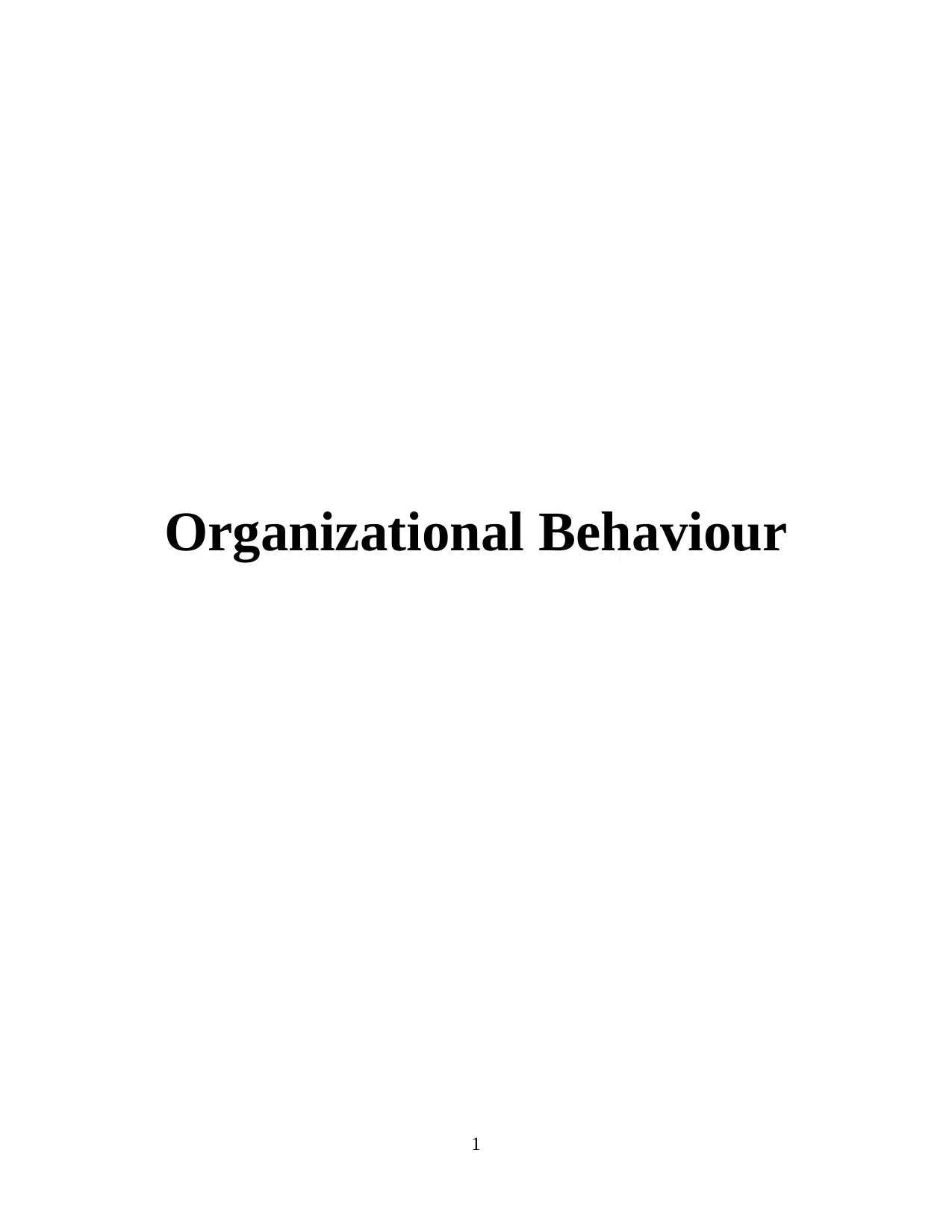
Organizational Behaviour
1
1
Paraphrase This Document
Need a fresh take? Get an instant paraphrase of this document with our AI Paraphraser
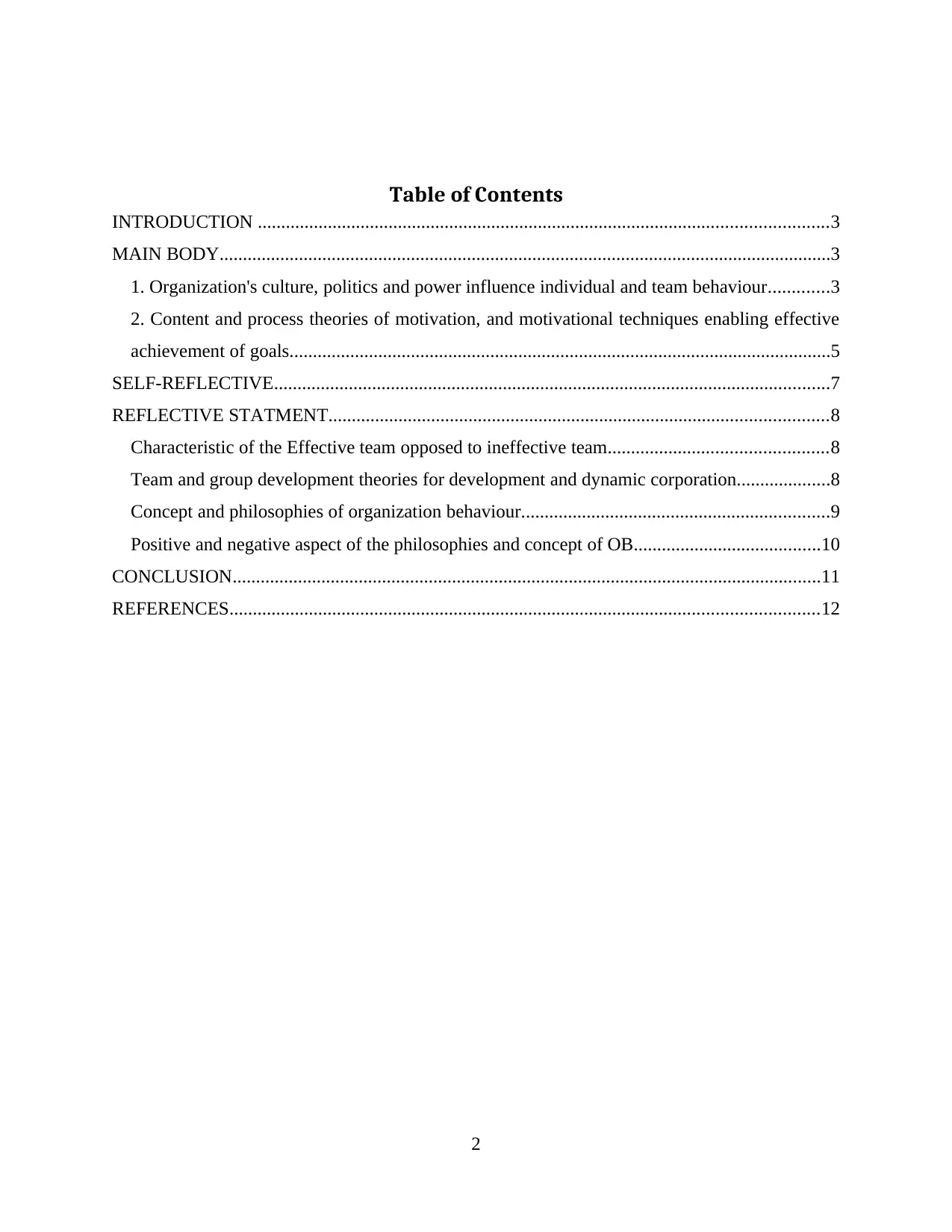
Table of Contents
INTRODUCTION ..........................................................................................................................3
MAIN BODY...................................................................................................................................3
1. Organization's culture, politics and power influence individual and team behaviour.............3
2. Content and process theories of motivation, and motivational techniques enabling effective
achievement of goals....................................................................................................................5
SELF-REFLECTIVE.......................................................................................................................7
REFLECTIVE STATMENT...........................................................................................................8
Characteristic of the Effective team opposed to ineffective team...............................................8
Team and group development theories for development and dynamic corporation....................8
Concept and philosophies of organization behaviour..................................................................9
Positive and negative aspect of the philosophies and concept of OB........................................10
CONCLUSION..............................................................................................................................11
REFERENCES..............................................................................................................................12
2
INTRODUCTION ..........................................................................................................................3
MAIN BODY...................................................................................................................................3
1. Organization's culture, politics and power influence individual and team behaviour.............3
2. Content and process theories of motivation, and motivational techniques enabling effective
achievement of goals....................................................................................................................5
SELF-REFLECTIVE.......................................................................................................................7
REFLECTIVE STATMENT...........................................................................................................8
Characteristic of the Effective team opposed to ineffective team...............................................8
Team and group development theories for development and dynamic corporation....................8
Concept and philosophies of organization behaviour..................................................................9
Positive and negative aspect of the philosophies and concept of OB........................................10
CONCLUSION..............................................................................................................................11
REFERENCES..............................................................................................................................12
2
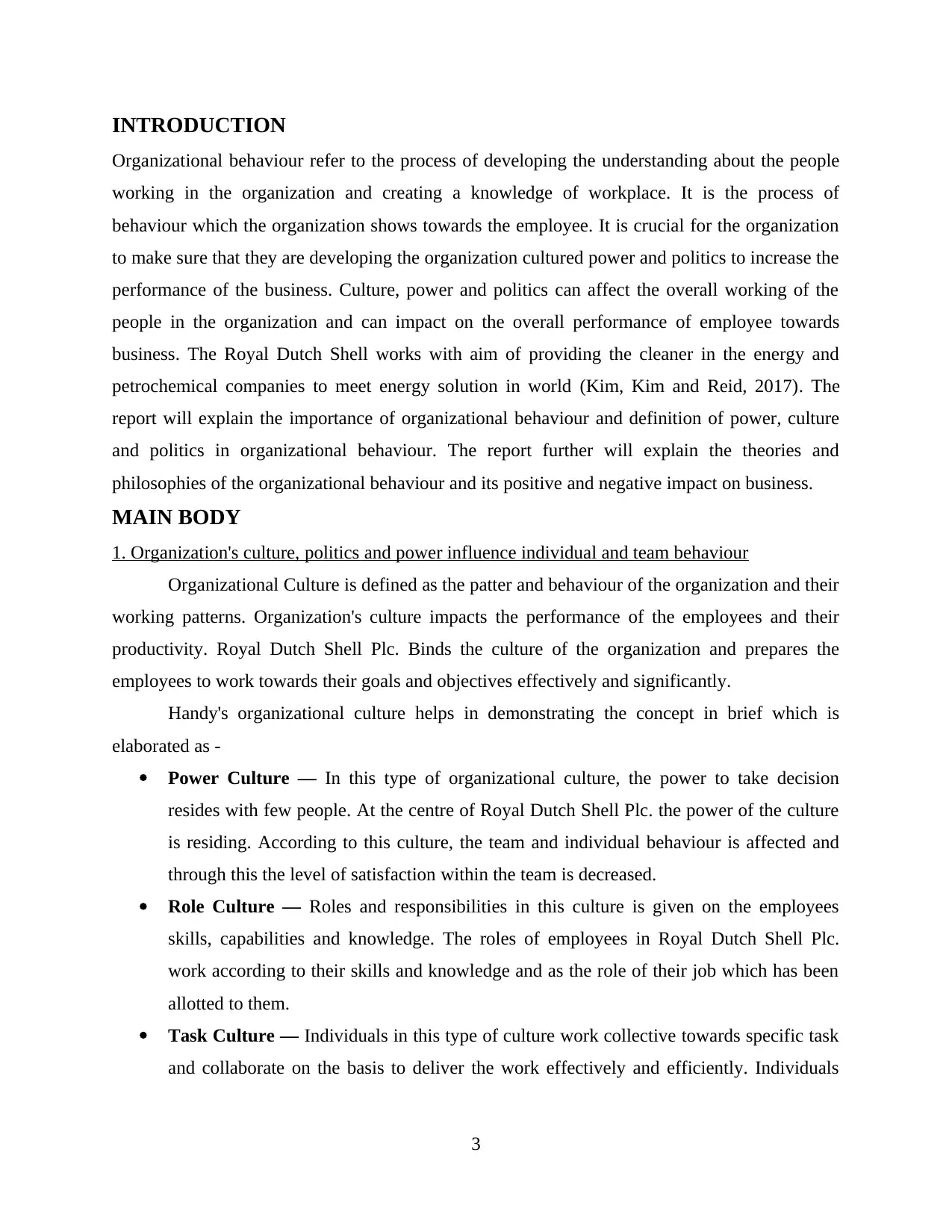
INTRODUCTION
Organizational behaviour refer to the process of developing the understanding about the people
working in the organization and creating a knowledge of workplace. It is the process of
behaviour which the organization shows towards the employee. It is crucial for the organization
to make sure that they are developing the organization cultured power and politics to increase the
performance of the business. Culture, power and politics can affect the overall working of the
people in the organization and can impact on the overall performance of employee towards
business. The Royal Dutch Shell works with aim of providing the cleaner in the energy and
petrochemical companies to meet energy solution in world (Kim, Kim and Reid, 2017). The
report will explain the importance of organizational behaviour and definition of power, culture
and politics in organizational behaviour. The report further will explain the theories and
philosophies of the organizational behaviour and its positive and negative impact on business.
MAIN BODY
1. Organization's culture, politics and power influence individual and team behaviour
Organizational Culture is defined as the patter and behaviour of the organization and their
working patterns. Organization's culture impacts the performance of the employees and their
productivity. Royal Dutch Shell Plc. Binds the culture of the organization and prepares the
employees to work towards their goals and objectives effectively and significantly.
Handy's organizational culture helps in demonstrating the concept in brief which is
elaborated as -
Power Culture — In this type of organizational culture, the power to take decision
resides with few people. At the centre of Royal Dutch Shell Plc. the power of the culture
is residing. According to this culture, the team and individual behaviour is affected and
through this the level of satisfaction within the team is decreased.
Role Culture — Roles and responsibilities in this culture is given on the employees
skills, capabilities and knowledge. The roles of employees in Royal Dutch Shell Plc.
work according to their skills and knowledge and as the role of their job which has been
allotted to them.
Task Culture — Individuals in this type of culture work collective towards specific task
and collaborate on the basis to deliver the work effectively and efficiently. Individuals
3
Organizational behaviour refer to the process of developing the understanding about the people
working in the organization and creating a knowledge of workplace. It is the process of
behaviour which the organization shows towards the employee. It is crucial for the organization
to make sure that they are developing the organization cultured power and politics to increase the
performance of the business. Culture, power and politics can affect the overall working of the
people in the organization and can impact on the overall performance of employee towards
business. The Royal Dutch Shell works with aim of providing the cleaner in the energy and
petrochemical companies to meet energy solution in world (Kim, Kim and Reid, 2017). The
report will explain the importance of organizational behaviour and definition of power, culture
and politics in organizational behaviour. The report further will explain the theories and
philosophies of the organizational behaviour and its positive and negative impact on business.
MAIN BODY
1. Organization's culture, politics and power influence individual and team behaviour
Organizational Culture is defined as the patter and behaviour of the organization and their
working patterns. Organization's culture impacts the performance of the employees and their
productivity. Royal Dutch Shell Plc. Binds the culture of the organization and prepares the
employees to work towards their goals and objectives effectively and significantly.
Handy's organizational culture helps in demonstrating the concept in brief which is
elaborated as -
Power Culture — In this type of organizational culture, the power to take decision
resides with few people. At the centre of Royal Dutch Shell Plc. the power of the culture
is residing. According to this culture, the team and individual behaviour is affected and
through this the level of satisfaction within the team is decreased.
Role Culture — Roles and responsibilities in this culture is given on the employees
skills, capabilities and knowledge. The roles of employees in Royal Dutch Shell Plc.
work according to their skills and knowledge and as the role of their job which has been
allotted to them.
Task Culture — Individuals in this type of culture work collective towards specific task
and collaborate on the basis to deliver the work effectively and efficiently. Individuals
3
⊘ This is a preview!⊘
Do you want full access?
Subscribe today to unlock all pages.

Trusted by 1+ million students worldwide
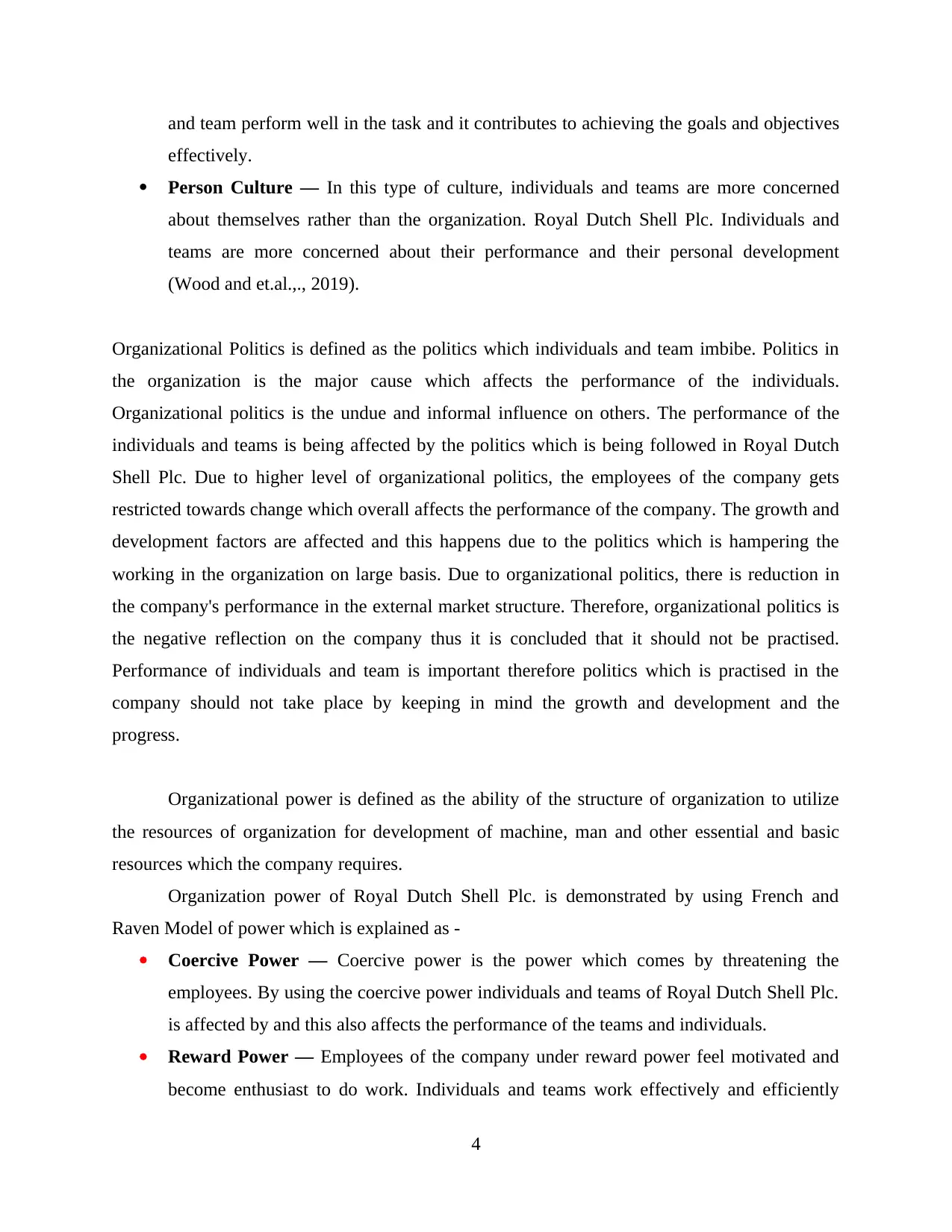
and team perform well in the task and it contributes to achieving the goals and objectives
effectively.
Person Culture — In this type of culture, individuals and teams are more concerned
about themselves rather than the organization. Royal Dutch Shell Plc. Individuals and
teams are more concerned about their performance and their personal development
(Wood and et.al.,., 2019).
Organizational Politics is defined as the politics which individuals and team imbibe. Politics in
the organization is the major cause which affects the performance of the individuals.
Organizational politics is the undue and informal influence on others. The performance of the
individuals and teams is being affected by the politics which is being followed in Royal Dutch
Shell Plc. Due to higher level of organizational politics, the employees of the company gets
restricted towards change which overall affects the performance of the company. The growth and
development factors are affected and this happens due to the politics which is hampering the
working in the organization on large basis. Due to organizational politics, there is reduction in
the company's performance in the external market structure. Therefore, organizational politics is
the negative reflection on the company thus it is concluded that it should not be practised.
Performance of individuals and team is important therefore politics which is practised in the
company should not take place by keeping in mind the growth and development and the
progress.
Organizational power is defined as the ability of the structure of organization to utilize
the resources of organization for development of machine, man and other essential and basic
resources which the company requires.
Organization power of Royal Dutch Shell Plc. is demonstrated by using French and
Raven Model of power which is explained as -
Coercive Power — Coercive power is the power which comes by threatening the
employees. By using the coercive power individuals and teams of Royal Dutch Shell Plc.
is affected by and this also affects the performance of the teams and individuals.
Reward Power — Employees of the company under reward power feel motivated and
become enthusiast to do work. Individuals and teams work effectively and efficiently
4
effectively.
Person Culture — In this type of culture, individuals and teams are more concerned
about themselves rather than the organization. Royal Dutch Shell Plc. Individuals and
teams are more concerned about their performance and their personal development
(Wood and et.al.,., 2019).
Organizational Politics is defined as the politics which individuals and team imbibe. Politics in
the organization is the major cause which affects the performance of the individuals.
Organizational politics is the undue and informal influence on others. The performance of the
individuals and teams is being affected by the politics which is being followed in Royal Dutch
Shell Plc. Due to higher level of organizational politics, the employees of the company gets
restricted towards change which overall affects the performance of the company. The growth and
development factors are affected and this happens due to the politics which is hampering the
working in the organization on large basis. Due to organizational politics, there is reduction in
the company's performance in the external market structure. Therefore, organizational politics is
the negative reflection on the company thus it is concluded that it should not be practised.
Performance of individuals and team is important therefore politics which is practised in the
company should not take place by keeping in mind the growth and development and the
progress.
Organizational power is defined as the ability of the structure of organization to utilize
the resources of organization for development of machine, man and other essential and basic
resources which the company requires.
Organization power of Royal Dutch Shell Plc. is demonstrated by using French and
Raven Model of power which is explained as -
Coercive Power — Coercive power is the power which comes by threatening the
employees. By using the coercive power individuals and teams of Royal Dutch Shell Plc.
is affected by and this also affects the performance of the teams and individuals.
Reward Power — Employees of the company under reward power feel motivated and
become enthusiast to do work. Individuals and teams work effectively and efficiently
4
Paraphrase This Document
Need a fresh take? Get an instant paraphrase of this document with our AI Paraphraser
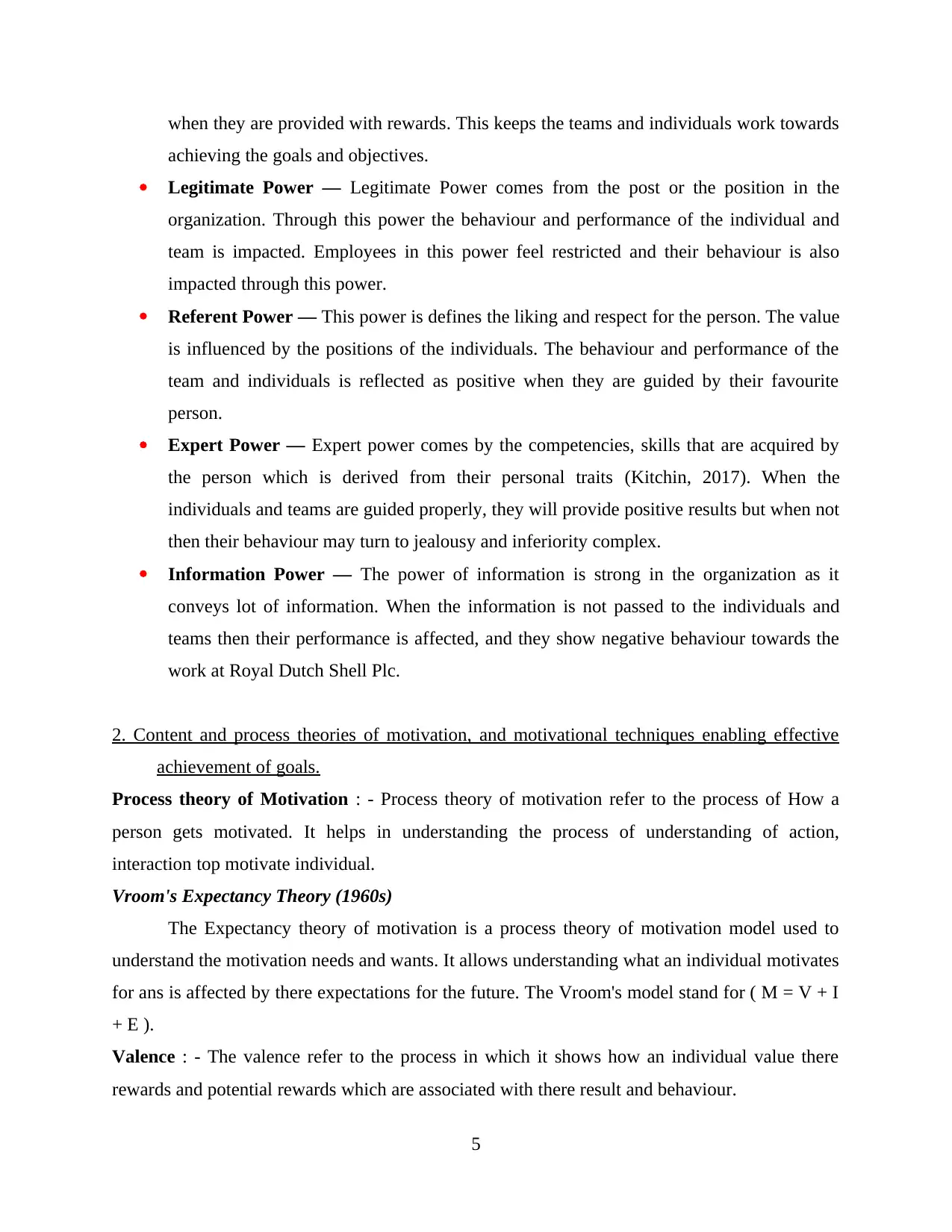
when they are provided with rewards. This keeps the teams and individuals work towards
achieving the goals and objectives.
Legitimate Power — Legitimate Power comes from the post or the position in the
organization. Through this power the behaviour and performance of the individual and
team is impacted. Employees in this power feel restricted and their behaviour is also
impacted through this power.
Referent Power — This power is defines the liking and respect for the person. The value
is influenced by the positions of the individuals. The behaviour and performance of the
team and individuals is reflected as positive when they are guided by their favourite
person.
Expert Power — Expert power comes by the competencies, skills that are acquired by
the person which is derived from their personal traits (Kitchin, 2017). When the
individuals and teams are guided properly, they will provide positive results but when not
then their behaviour may turn to jealousy and inferiority complex.
Information Power — The power of information is strong in the organization as it
conveys lot of information. When the information is not passed to the individuals and
teams then their performance is affected, and they show negative behaviour towards the
work at Royal Dutch Shell Plc.
2. Content and process theories of motivation, and motivational techniques enabling effective
achievement of goals.
Process theory of Motivation : - Process theory of motivation refer to the process of How a
person gets motivated. It helps in understanding the process of understanding of action,
interaction top motivate individual.
Vroom's Expectancy Theory (1960s)
The Expectancy theory of motivation is a process theory of motivation model used to
understand the motivation needs and wants. It allows understanding what an individual motivates
for ans is affected by there expectations for the future. The Vroom's model stand for ( M = V + I
+ E ).
Valence : - The valence refer to the process in which it shows how an individual value there
rewards and potential rewards which are associated with there result and behaviour.
5
achieving the goals and objectives.
Legitimate Power — Legitimate Power comes from the post or the position in the
organization. Through this power the behaviour and performance of the individual and
team is impacted. Employees in this power feel restricted and their behaviour is also
impacted through this power.
Referent Power — This power is defines the liking and respect for the person. The value
is influenced by the positions of the individuals. The behaviour and performance of the
team and individuals is reflected as positive when they are guided by their favourite
person.
Expert Power — Expert power comes by the competencies, skills that are acquired by
the person which is derived from their personal traits (Kitchin, 2017). When the
individuals and teams are guided properly, they will provide positive results but when not
then their behaviour may turn to jealousy and inferiority complex.
Information Power — The power of information is strong in the organization as it
conveys lot of information. When the information is not passed to the individuals and
teams then their performance is affected, and they show negative behaviour towards the
work at Royal Dutch Shell Plc.
2. Content and process theories of motivation, and motivational techniques enabling effective
achievement of goals.
Process theory of Motivation : - Process theory of motivation refer to the process of How a
person gets motivated. It helps in understanding the process of understanding of action,
interaction top motivate individual.
Vroom's Expectancy Theory (1960s)
The Expectancy theory of motivation is a process theory of motivation model used to
understand the motivation needs and wants. It allows understanding what an individual motivates
for ans is affected by there expectations for the future. The Vroom's model stand for ( M = V + I
+ E ).
Valence : - The valence refer to the process in which it shows how an individual value there
rewards and potential rewards which are associated with there result and behaviour.
5
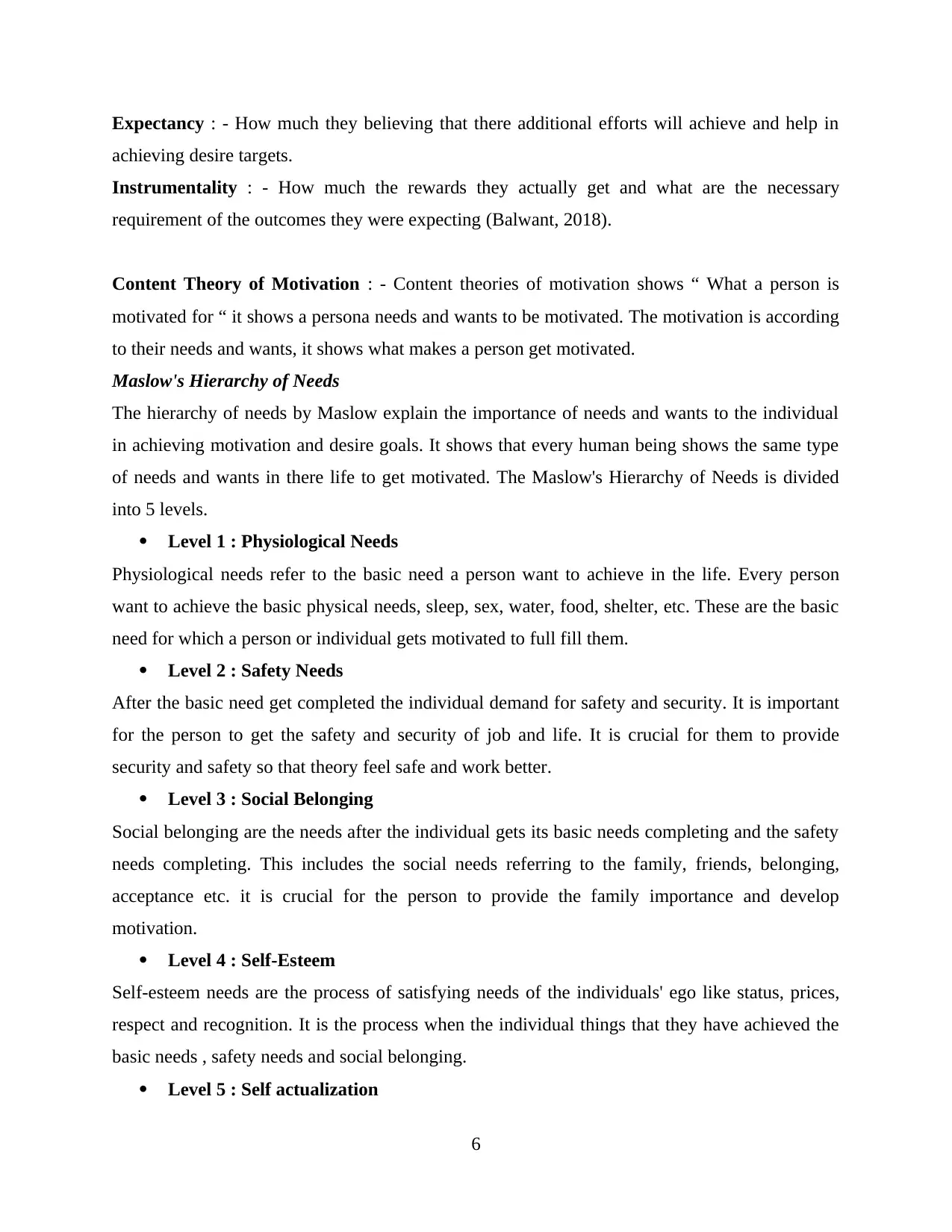
Expectancy : - How much they believing that there additional efforts will achieve and help in
achieving desire targets.
Instrumentality : - How much the rewards they actually get and what are the necessary
requirement of the outcomes they were expecting (Balwant, 2018).
Content Theory of Motivation : - Content theories of motivation shows “ What a person is
motivated for “ it shows a persona needs and wants to be motivated. The motivation is according
to their needs and wants, it shows what makes a person get motivated.
Maslow's Hierarchy of Needs
The hierarchy of needs by Maslow explain the importance of needs and wants to the individual
in achieving motivation and desire goals. It shows that every human being shows the same type
of needs and wants in there life to get motivated. The Maslow's Hierarchy of Needs is divided
into 5 levels.
Level 1 : Physiological Needs
Physiological needs refer to the basic need a person want to achieve in the life. Every person
want to achieve the basic physical needs, sleep, sex, water, food, shelter, etc. These are the basic
need for which a person or individual gets motivated to full fill them.
Level 2 : Safety Needs
After the basic need get completed the individual demand for safety and security. It is important
for the person to get the safety and security of job and life. It is crucial for them to provide
security and safety so that theory feel safe and work better.
Level 3 : Social Belonging
Social belonging are the needs after the individual gets its basic needs completing and the safety
needs completing. This includes the social needs referring to the family, friends, belonging,
acceptance etc. it is crucial for the person to provide the family importance and develop
motivation.
Level 4 : Self-Esteem
Self-esteem needs are the process of satisfying needs of the individuals' ego like status, prices,
respect and recognition. It is the process when the individual things that they have achieved the
basic needs , safety needs and social belonging.
Level 5 : Self actualization
6
achieving desire targets.
Instrumentality : - How much the rewards they actually get and what are the necessary
requirement of the outcomes they were expecting (Balwant, 2018).
Content Theory of Motivation : - Content theories of motivation shows “ What a person is
motivated for “ it shows a persona needs and wants to be motivated. The motivation is according
to their needs and wants, it shows what makes a person get motivated.
Maslow's Hierarchy of Needs
The hierarchy of needs by Maslow explain the importance of needs and wants to the individual
in achieving motivation and desire goals. It shows that every human being shows the same type
of needs and wants in there life to get motivated. The Maslow's Hierarchy of Needs is divided
into 5 levels.
Level 1 : Physiological Needs
Physiological needs refer to the basic need a person want to achieve in the life. Every person
want to achieve the basic physical needs, sleep, sex, water, food, shelter, etc. These are the basic
need for which a person or individual gets motivated to full fill them.
Level 2 : Safety Needs
After the basic need get completed the individual demand for safety and security. It is important
for the person to get the safety and security of job and life. It is crucial for them to provide
security and safety so that theory feel safe and work better.
Level 3 : Social Belonging
Social belonging are the needs after the individual gets its basic needs completing and the safety
needs completing. This includes the social needs referring to the family, friends, belonging,
acceptance etc. it is crucial for the person to provide the family importance and develop
motivation.
Level 4 : Self-Esteem
Self-esteem needs are the process of satisfying needs of the individuals' ego like status, prices,
respect and recognition. It is the process when the individual things that they have achieved the
basic needs , safety needs and social belonging.
Level 5 : Self actualization
6
⊘ This is a preview!⊘
Do you want full access?
Subscribe today to unlock all pages.

Trusted by 1+ million students worldwide
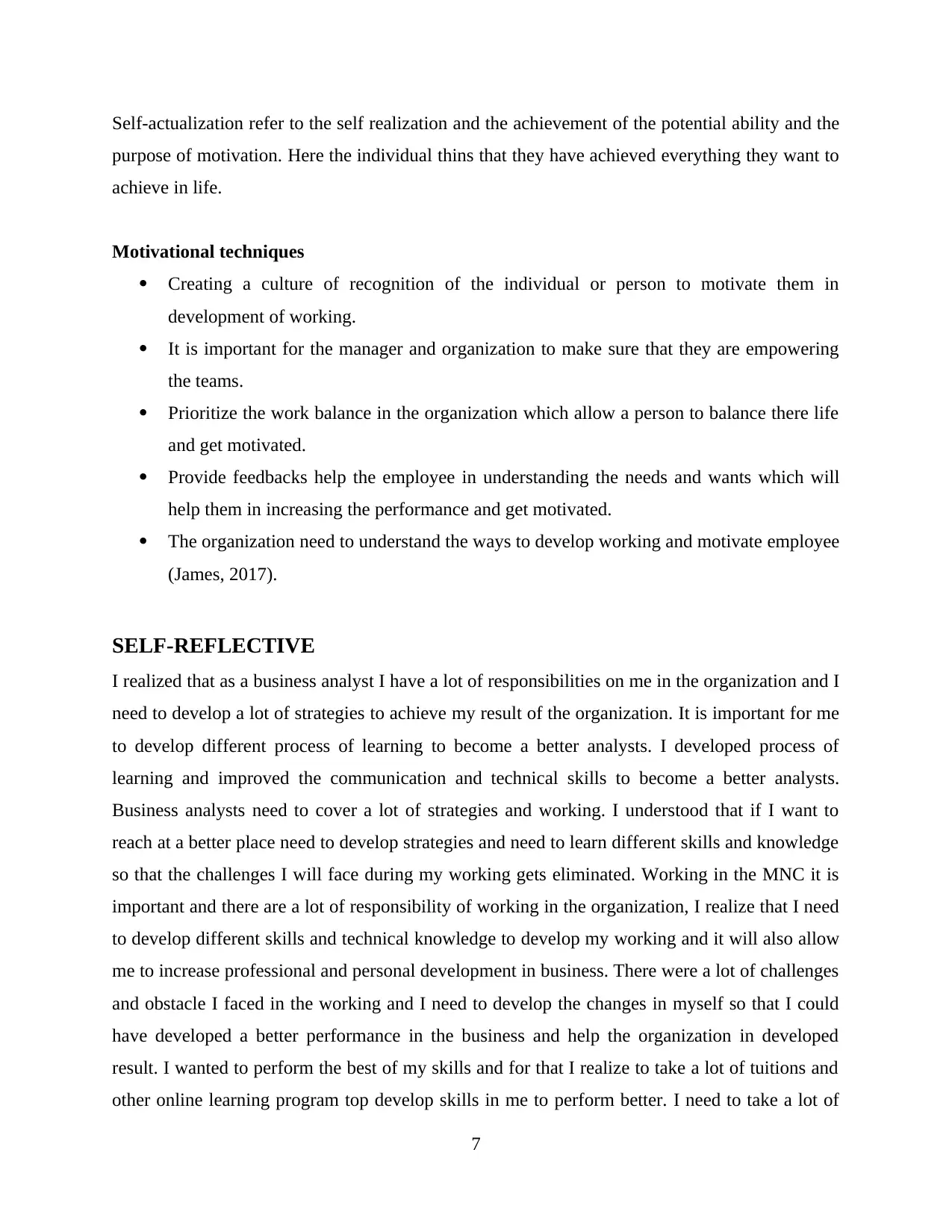
Self-actualization refer to the self realization and the achievement of the potential ability and the
purpose of motivation. Here the individual thins that they have achieved everything they want to
achieve in life.
Motivational techniques
Creating a culture of recognition of the individual or person to motivate them in
development of working.
It is important for the manager and organization to make sure that they are empowering
the teams.
Prioritize the work balance in the organization which allow a person to balance there life
and get motivated.
Provide feedbacks help the employee in understanding the needs and wants which will
help them in increasing the performance and get motivated.
The organization need to understand the ways to develop working and motivate employee
(James, 2017).
SELF-REFLECTIVE
I realized that as a business analyst I have a lot of responsibilities on me in the organization and I
need to develop a lot of strategies to achieve my result of the organization. It is important for me
to develop different process of learning to become a better analysts. I developed process of
learning and improved the communication and technical skills to become a better analysts.
Business analysts need to cover a lot of strategies and working. I understood that if I want to
reach at a better place need to develop strategies and need to learn different skills and knowledge
so that the challenges I will face during my working gets eliminated. Working in the MNC it is
important and there are a lot of responsibility of working in the organization, I realize that I need
to develop different skills and technical knowledge to develop my working and it will also allow
me to increase professional and personal development in business. There were a lot of challenges
and obstacle I faced in the working and I need to develop the changes in myself so that I could
have developed a better performance in the business and help the organization in developed
result. I wanted to perform the best of my skills and for that I realize to take a lot of tuitions and
other online learning program top develop skills in me to perform better. I need to take a lot of
7
purpose of motivation. Here the individual thins that they have achieved everything they want to
achieve in life.
Motivational techniques
Creating a culture of recognition of the individual or person to motivate them in
development of working.
It is important for the manager and organization to make sure that they are empowering
the teams.
Prioritize the work balance in the organization which allow a person to balance there life
and get motivated.
Provide feedbacks help the employee in understanding the needs and wants which will
help them in increasing the performance and get motivated.
The organization need to understand the ways to develop working and motivate employee
(James, 2017).
SELF-REFLECTIVE
I realized that as a business analyst I have a lot of responsibilities on me in the organization and I
need to develop a lot of strategies to achieve my result of the organization. It is important for me
to develop different process of learning to become a better analysts. I developed process of
learning and improved the communication and technical skills to become a better analysts.
Business analysts need to cover a lot of strategies and working. I understood that if I want to
reach at a better place need to develop strategies and need to learn different skills and knowledge
so that the challenges I will face during my working gets eliminated. Working in the MNC it is
important and there are a lot of responsibility of working in the organization, I realize that I need
to develop different skills and technical knowledge to develop my working and it will also allow
me to increase professional and personal development in business. There were a lot of challenges
and obstacle I faced in the working and I need to develop the changes in myself so that I could
have developed a better performance in the business and help the organization in developed
result. I wanted to perform the best of my skills and for that I realize to take a lot of tuitions and
other online learning program top develop skills in me to perform better. I need to take a lot of
7
Paraphrase This Document
Need a fresh take? Get an instant paraphrase of this document with our AI Paraphraser
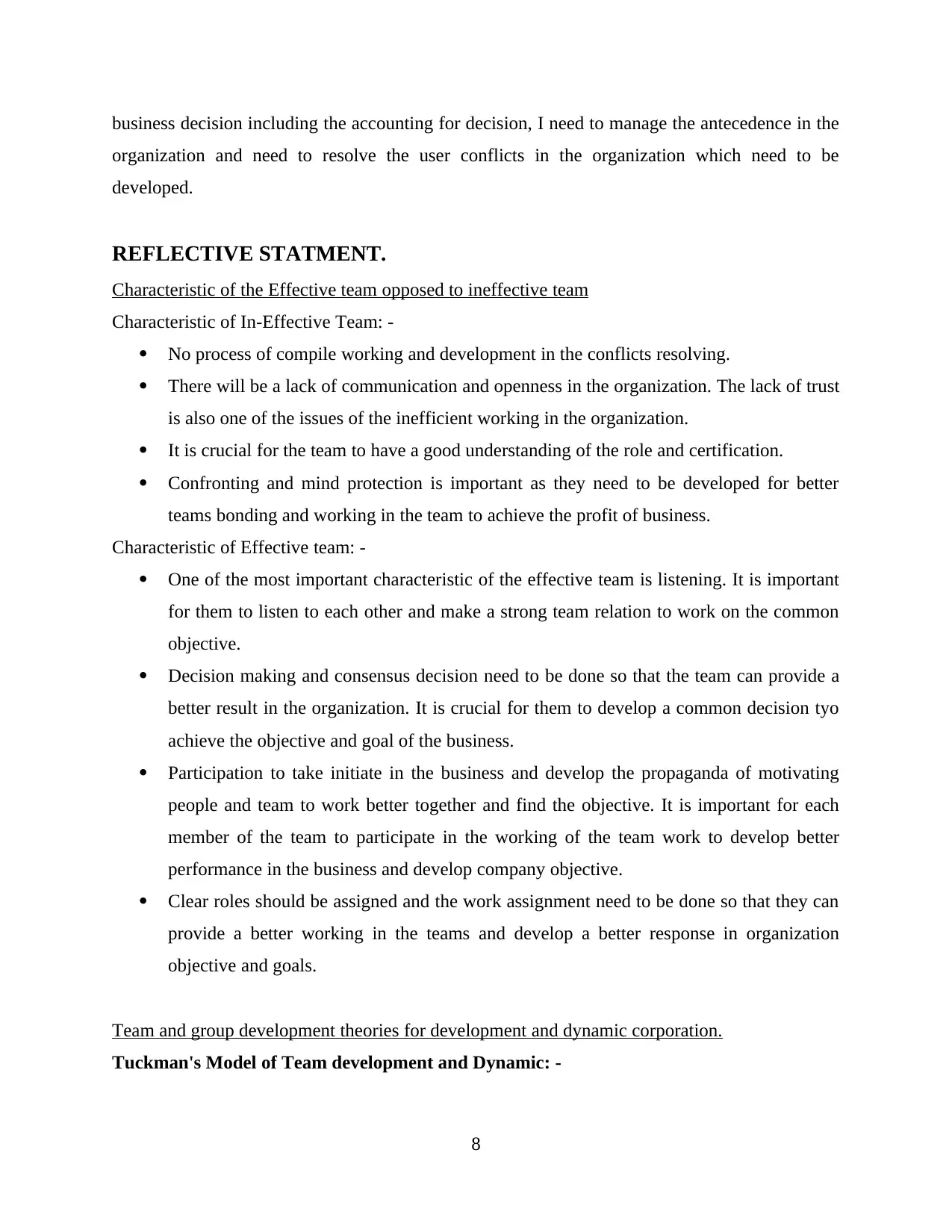
business decision including the accounting for decision, I need to manage the antecedence in the
organization and need to resolve the user conflicts in the organization which need to be
developed.
REFLECTIVE STATMENT.
Characteristic of the Effective team opposed to ineffective team
Characteristic of In-Effective Team: -
No process of compile working and development in the conflicts resolving.
There will be a lack of communication and openness in the organization. The lack of trust
is also one of the issues of the inefficient working in the organization.
It is crucial for the team to have a good understanding of the role and certification.
Confronting and mind protection is important as they need to be developed for better
teams bonding and working in the team to achieve the profit of business.
Characteristic of Effective team: -
One of the most important characteristic of the effective team is listening. It is important
for them to listen to each other and make a strong team relation to work on the common
objective.
Decision making and consensus decision need to be done so that the team can provide a
better result in the organization. It is crucial for them to develop a common decision tyo
achieve the objective and goal of the business.
Participation to take initiate in the business and develop the propaganda of motivating
people and team to work better together and find the objective. It is important for each
member of the team to participate in the working of the team work to develop better
performance in the business and develop company objective.
Clear roles should be assigned and the work assignment need to be done so that they can
provide a better working in the teams and develop a better response in organization
objective and goals.
Team and group development theories for development and dynamic corporation.
Tuckman's Model of Team development and Dynamic: -
8
organization and need to resolve the user conflicts in the organization which need to be
developed.
REFLECTIVE STATMENT.
Characteristic of the Effective team opposed to ineffective team
Characteristic of In-Effective Team: -
No process of compile working and development in the conflicts resolving.
There will be a lack of communication and openness in the organization. The lack of trust
is also one of the issues of the inefficient working in the organization.
It is crucial for the team to have a good understanding of the role and certification.
Confronting and mind protection is important as they need to be developed for better
teams bonding and working in the team to achieve the profit of business.
Characteristic of Effective team: -
One of the most important characteristic of the effective team is listening. It is important
for them to listen to each other and make a strong team relation to work on the common
objective.
Decision making and consensus decision need to be done so that the team can provide a
better result in the organization. It is crucial for them to develop a common decision tyo
achieve the objective and goal of the business.
Participation to take initiate in the business and develop the propaganda of motivating
people and team to work better together and find the objective. It is important for each
member of the team to participate in the working of the team work to develop better
performance in the business and develop company objective.
Clear roles should be assigned and the work assignment need to be done so that they can
provide a better working in the teams and develop a better response in organization
objective and goals.
Team and group development theories for development and dynamic corporation.
Tuckman's Model of Team development and Dynamic: -
8
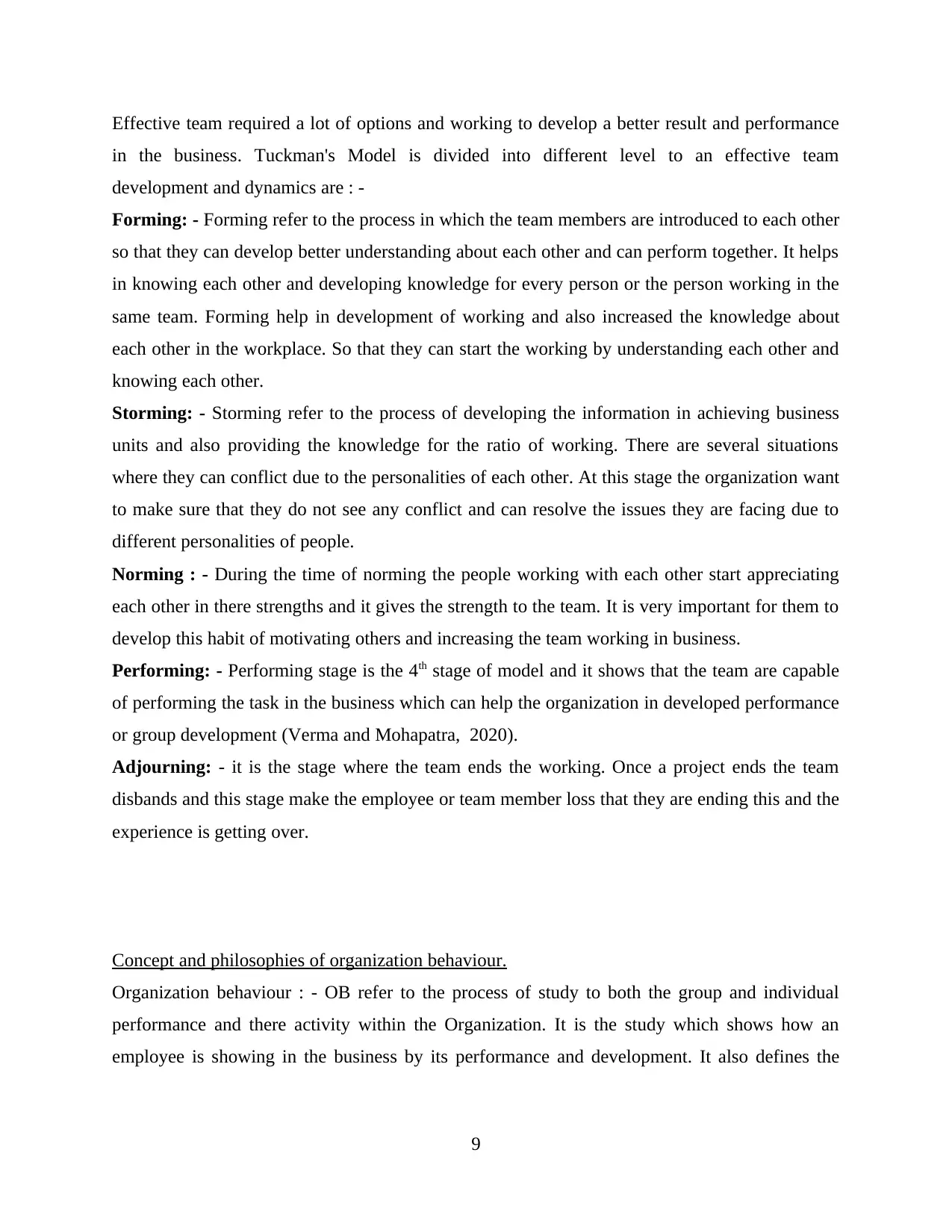
Effective team required a lot of options and working to develop a better result and performance
in the business. Tuckman's Model is divided into different level to an effective team
development and dynamics are : -
Forming: - Forming refer to the process in which the team members are introduced to each other
so that they can develop better understanding about each other and can perform together. It helps
in knowing each other and developing knowledge for every person or the person working in the
same team. Forming help in development of working and also increased the knowledge about
each other in the workplace. So that they can start the working by understanding each other and
knowing each other.
Storming: - Storming refer to the process of developing the information in achieving business
units and also providing the knowledge for the ratio of working. There are several situations
where they can conflict due to the personalities of each other. At this stage the organization want
to make sure that they do not see any conflict and can resolve the issues they are facing due to
different personalities of people.
Norming : - During the time of norming the people working with each other start appreciating
each other in there strengths and it gives the strength to the team. It is very important for them to
develop this habit of motivating others and increasing the team working in business.
Performing: - Performing stage is the 4th stage of model and it shows that the team are capable
of performing the task in the business which can help the organization in developed performance
or group development (Verma and Mohapatra, 2020).
Adjourning: - it is the stage where the team ends the working. Once a project ends the team
disbands and this stage make the employee or team member loss that they are ending this and the
experience is getting over.
Concept and philosophies of organization behaviour.
Organization behaviour : - OB refer to the process of study to both the group and individual
performance and there activity within the Organization. It is the study which shows how an
employee is showing in the business by its performance and development. It also defines the
9
in the business. Tuckman's Model is divided into different level to an effective team
development and dynamics are : -
Forming: - Forming refer to the process in which the team members are introduced to each other
so that they can develop better understanding about each other and can perform together. It helps
in knowing each other and developing knowledge for every person or the person working in the
same team. Forming help in development of working and also increased the knowledge about
each other in the workplace. So that they can start the working by understanding each other and
knowing each other.
Storming: - Storming refer to the process of developing the information in achieving business
units and also providing the knowledge for the ratio of working. There are several situations
where they can conflict due to the personalities of each other. At this stage the organization want
to make sure that they do not see any conflict and can resolve the issues they are facing due to
different personalities of people.
Norming : - During the time of norming the people working with each other start appreciating
each other in there strengths and it gives the strength to the team. It is very important for them to
develop this habit of motivating others and increasing the team working in business.
Performing: - Performing stage is the 4th stage of model and it shows that the team are capable
of performing the task in the business which can help the organization in developed performance
or group development (Verma and Mohapatra, 2020).
Adjourning: - it is the stage where the team ends the working. Once a project ends the team
disbands and this stage make the employee or team member loss that they are ending this and the
experience is getting over.
Concept and philosophies of organization behaviour.
Organization behaviour : - OB refer to the process of study to both the group and individual
performance and there activity within the Organization. It is the study which shows how an
employee is showing in the business by its performance and development. It also defines the
9
⊘ This is a preview!⊘
Do you want full access?
Subscribe today to unlock all pages.

Trusted by 1+ million students worldwide
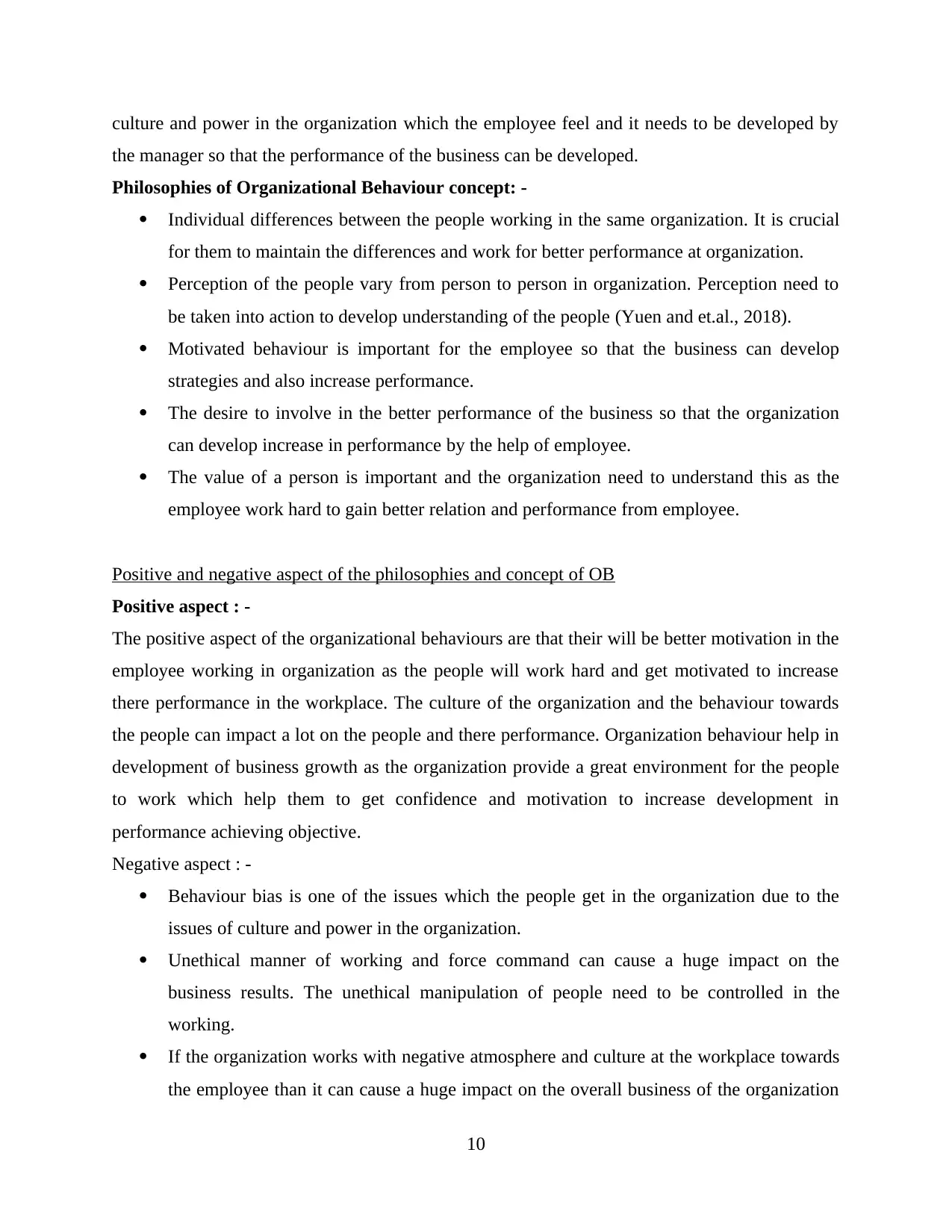
culture and power in the organization which the employee feel and it needs to be developed by
the manager so that the performance of the business can be developed.
Philosophies of Organizational Behaviour concept: -
Individual differences between the people working in the same organization. It is crucial
for them to maintain the differences and work for better performance at organization.
Perception of the people vary from person to person in organization. Perception need to
be taken into action to develop understanding of the people (Yuen and et.al., 2018).
Motivated behaviour is important for the employee so that the business can develop
strategies and also increase performance.
The desire to involve in the better performance of the business so that the organization
can develop increase in performance by the help of employee.
The value of a person is important and the organization need to understand this as the
employee work hard to gain better relation and performance from employee.
Positive and negative aspect of the philosophies and concept of OB
Positive aspect : -
The positive aspect of the organizational behaviours are that their will be better motivation in the
employee working in organization as the people will work hard and get motivated to increase
there performance in the workplace. The culture of the organization and the behaviour towards
the people can impact a lot on the people and there performance. Organization behaviour help in
development of business growth as the organization provide a great environment for the people
to work which help them to get confidence and motivation to increase development in
performance achieving objective.
Negative aspect : -
Behaviour bias is one of the issues which the people get in the organization due to the
issues of culture and power in the organization.
Unethical manner of working and force command can cause a huge impact on the
business results. The unethical manipulation of people need to be controlled in the
working.
If the organization works with negative atmosphere and culture at the workplace towards
the employee than it can cause a huge impact on the overall business of the organization
10
the manager so that the performance of the business can be developed.
Philosophies of Organizational Behaviour concept: -
Individual differences between the people working in the same organization. It is crucial
for them to maintain the differences and work for better performance at organization.
Perception of the people vary from person to person in organization. Perception need to
be taken into action to develop understanding of the people (Yuen and et.al., 2018).
Motivated behaviour is important for the employee so that the business can develop
strategies and also increase performance.
The desire to involve in the better performance of the business so that the organization
can develop increase in performance by the help of employee.
The value of a person is important and the organization need to understand this as the
employee work hard to gain better relation and performance from employee.
Positive and negative aspect of the philosophies and concept of OB
Positive aspect : -
The positive aspect of the organizational behaviours are that their will be better motivation in the
employee working in organization as the people will work hard and get motivated to increase
there performance in the workplace. The culture of the organization and the behaviour towards
the people can impact a lot on the people and there performance. Organization behaviour help in
development of business growth as the organization provide a great environment for the people
to work which help them to get confidence and motivation to increase development in
performance achieving objective.
Negative aspect : -
Behaviour bias is one of the issues which the people get in the organization due to the
issues of culture and power in the organization.
Unethical manner of working and force command can cause a huge impact on the
business results. The unethical manipulation of people need to be controlled in the
working.
If the organization works with negative atmosphere and culture at the workplace towards
the employee than it can cause a huge impact on the overall business of the organization
10
Paraphrase This Document
Need a fresh take? Get an instant paraphrase of this document with our AI Paraphraser
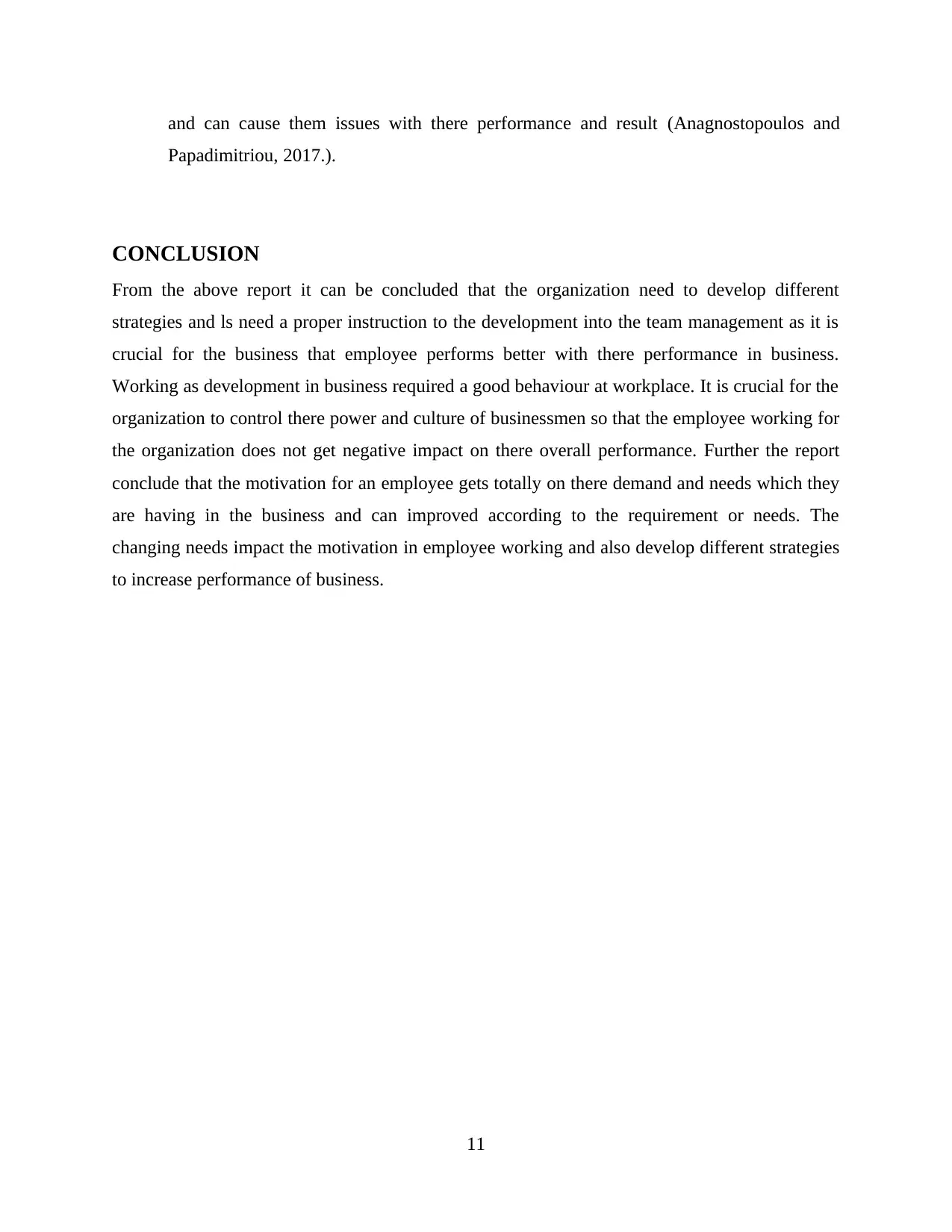
and can cause them issues with there performance and result (Anagnostopoulos and
Papadimitriou, 2017.).
CONCLUSION
From the above report it can be concluded that the organization need to develop different
strategies and ls need a proper instruction to the development into the team management as it is
crucial for the business that employee performs better with there performance in business.
Working as development in business required a good behaviour at workplace. It is crucial for the
organization to control there power and culture of businessmen so that the employee working for
the organization does not get negative impact on there overall performance. Further the report
conclude that the motivation for an employee gets totally on there demand and needs which they
are having in the business and can improved according to the requirement or needs. The
changing needs impact the motivation in employee working and also develop different strategies
to increase performance of business.
11
Papadimitriou, 2017.).
CONCLUSION
From the above report it can be concluded that the organization need to develop different
strategies and ls need a proper instruction to the development into the team management as it is
crucial for the business that employee performs better with there performance in business.
Working as development in business required a good behaviour at workplace. It is crucial for the
organization to control there power and culture of businessmen so that the employee working for
the organization does not get negative impact on there overall performance. Further the report
conclude that the motivation for an employee gets totally on there demand and needs which they
are having in the business and can improved according to the requirement or needs. The
changing needs impact the motivation in employee working and also develop different strategies
to increase performance of business.
11
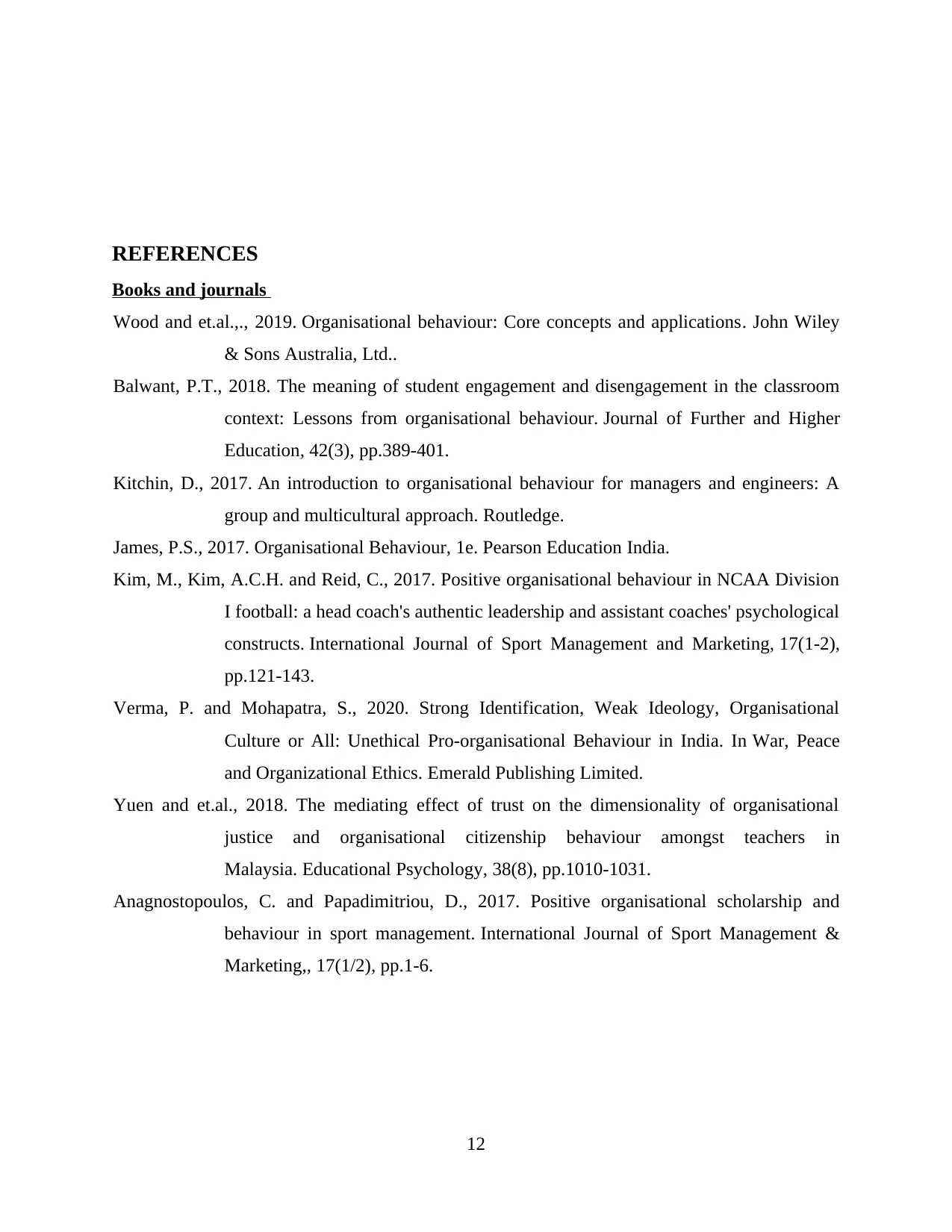
REFERENCES
Books and journals
Wood and et.al.,., 2019. Organisational behaviour: Core concepts and applications. John Wiley
& Sons Australia, Ltd..
Balwant, P.T., 2018. The meaning of student engagement and disengagement in the classroom
context: Lessons from organisational behaviour. Journal of Further and Higher
Education, 42(3), pp.389-401.
Kitchin, D., 2017. An introduction to organisational behaviour for managers and engineers: A
group and multicultural approach. Routledge.
James, P.S., 2017. Organisational Behaviour, 1e. Pearson Education India.
Kim, M., Kim, A.C.H. and Reid, C., 2017. Positive organisational behaviour in NCAA Division
I football: a head coach's authentic leadership and assistant coaches' psychological
constructs. International Journal of Sport Management and Marketing, 17(1-2),
pp.121-143.
Verma, P. and Mohapatra, S., 2020. Strong Identification, Weak Ideology, Organisational
Culture or All: Unethical Pro-organisational Behaviour in India. In War, Peace
and Organizational Ethics. Emerald Publishing Limited.
Yuen and et.al., 2018. The mediating effect of trust on the dimensionality of organisational
justice and organisational citizenship behaviour amongst teachers in
Malaysia. Educational Psychology, 38(8), pp.1010-1031.
Anagnostopoulos, C. and Papadimitriou, D., 2017. Positive organisational scholarship and
behaviour in sport management. International Journal of Sport Management &
Marketing,, 17(1/2), pp.1-6.
12
Books and journals
Wood and et.al.,., 2019. Organisational behaviour: Core concepts and applications. John Wiley
& Sons Australia, Ltd..
Balwant, P.T., 2018. The meaning of student engagement and disengagement in the classroom
context: Lessons from organisational behaviour. Journal of Further and Higher
Education, 42(3), pp.389-401.
Kitchin, D., 2017. An introduction to organisational behaviour for managers and engineers: A
group and multicultural approach. Routledge.
James, P.S., 2017. Organisational Behaviour, 1e. Pearson Education India.
Kim, M., Kim, A.C.H. and Reid, C., 2017. Positive organisational behaviour in NCAA Division
I football: a head coach's authentic leadership and assistant coaches' psychological
constructs. International Journal of Sport Management and Marketing, 17(1-2),
pp.121-143.
Verma, P. and Mohapatra, S., 2020. Strong Identification, Weak Ideology, Organisational
Culture or All: Unethical Pro-organisational Behaviour in India. In War, Peace
and Organizational Ethics. Emerald Publishing Limited.
Yuen and et.al., 2018. The mediating effect of trust on the dimensionality of organisational
justice and organisational citizenship behaviour amongst teachers in
Malaysia. Educational Psychology, 38(8), pp.1010-1031.
Anagnostopoulos, C. and Papadimitriou, D., 2017. Positive organisational scholarship and
behaviour in sport management. International Journal of Sport Management &
Marketing,, 17(1/2), pp.1-6.
12
⊘ This is a preview!⊘
Do you want full access?
Subscribe today to unlock all pages.

Trusted by 1+ million students worldwide
1 out of 13
Related Documents
Your All-in-One AI-Powered Toolkit for Academic Success.
+13062052269
info@desklib.com
Available 24*7 on WhatsApp / Email
![[object Object]](/_next/static/media/star-bottom.7253800d.svg)
Unlock your academic potential
Copyright © 2020–2026 A2Z Services. All Rights Reserved. Developed and managed by ZUCOL.





